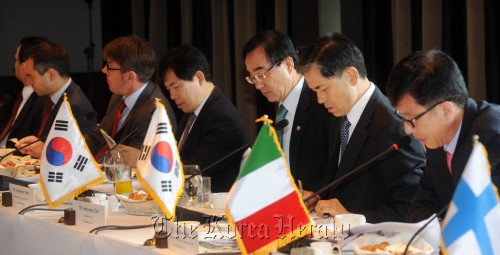Korea launches task force to enforce strict origin management
Lack of strict origin management by the government is making it difficult for local exporters to take advantage of preferential tax treatment they are entitled to once the Korea-EU free trade agreement goes into effect on July 1.
Only one-quarter of local companies eligible for tax benefits from the trade deal have attained certificates proving that their products are made-in-Korea ―- something every domestic exporter shipping products to the EU worth at least 6,000 euro ($8,546) per case must obtain to benefit from tax breaks.
The Korea Customs Service and the trade bureaus of the Foreign Ministry and Finance Ministry launched a taskforce this week to encourage companies to attain certificates to prevent origin-manipulation.
Lack of strict origin management by the government is making it difficult for local exporters to take advantage of preferential tax treatment they are entitled to once the Korea-EU free trade agreement goes into effect on July 1.
Only one-quarter of local companies eligible for tax benefits from the trade deal have attained certificates proving that their products are made-in-Korea ―- something every domestic exporter shipping products to the EU worth at least 6,000 euro ($8,546) per case must obtain to benefit from tax breaks.
The Korea Customs Service and the trade bureaus of the Foreign Ministry and Finance Ministry launched a taskforce this week to encourage companies to attain certificates to prevent origin-manipulation.

But experts say the origin issue is highly likely to prevent a smooth flow of goods into Europe.
“Goods without country-of-origin certs could stack up in ports and incur huge expenses. The authorities will face the challenge of tightening inspection of origin-manipulated goods while simplifying the customs service for the ones with certificates,” Kwak Soo-jong, a trade specialist at the Samsung Economic Research Institute said.
The European bloc’s first trade accord with Asia’s fourth largest economy stands to eliminate virtually all custom duties over the next five years. Under the pact, both parties agreed to phase out 96 percent of tariffs on EU goods and 99 percent of tariffs on Korean goods within three years from July onwards.
Tariffs on industrial goods will be phased out in five years. Tariff cuts on some farm products, subject to more trade protection, will take longer. Rice is completely excluded from the list. Brussels and Seoul signed the bilateral agreement on Oct. 6 after three and a half years of negotiations. It was ratified by both parties on Feb. 17 and May 5 respectively.
The two-way trade in 2009 totaled 53.5 billion euros, with Korean exports accounting for 32 billion euros.
The customs agency has been sending its staff to small businesses eligible for tax treatment under Korea-EU FTA but said it will take some time for the majority to receive tax benefits.
“We’re encouraging small to medium sized businesses to attain country of origin certificates. We’re trying to make about 60 percent of exporters to do so within this year,” Yoon Young-sun, commissioner of the KCS told ambassadors of European Union at a roundtable discussion he chaired in Seoul on Friday.
Some small businesses could choose not to take advantage of tax benefits.
“About 10 to 20 percent of small businesses could just choose not to register their products and pay higher tariffs because it may cost more to manage the certificate system every time they want to export a new product,” a KCS official said.
The agency said it is tightening the tracking system to prevent trans-shipment of products coming from a third country but acknowledged that origin manipulation is a growing problem.
“I understand that car components made in China and other emerging economies are repackaged here to be sold as a made-in-Korea to Europe,” Yoon said.
The KCS hosting an exhibition of commonly forged goods on July 6 at COEX, Seoul.
By Cynthia J. Kim (cynthiak@heraldcorp.com)








![[Graphic News] More Koreans say they plan long-distance trips this year](http://res.heraldm.com/phpwas/restmb_idxmake.php?idx=644&simg=/content/image/2024/04/17/20240417050828_0.gif&u=)
![[KH Explains] Hyundai's full hybrid edge to pay off amid slow transition to pure EVs](http://res.heraldm.com/phpwas/restmb_idxmake.php?idx=644&simg=/content/image/2024/04/18/20240418050645_0.jpg&u=20240419100350)





![[From the Scene] Monks, Buddhists hail return of remains of Buddhas](http://res.heraldm.com/phpwas/restmb_idxmake.php?idx=652&simg=/content/image/2024/04/19/20240419050617_0.jpg&u=20240419175937)

![[KH Explains] Hyundai's full hybrid edge to pay off amid slow transition to pure EVs](http://res.heraldm.com/phpwas/restmb_idxmake.php?idx=652&simg=/content/image/2024/04/18/20240418050645_0.jpg&u=20240419100350)

![[Today’s K-pop] Illit drops debut single remix](http://res.heraldm.com/phpwas/restmb_idxmake.php?idx=642&simg=/content/image/2024/04/19/20240419050612_0.jpg&u=)